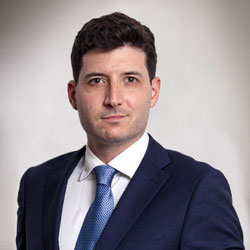Joseph “Joey” Smith Of Cassel Salpeter & Co On The Future Of Aviation and Aviation Tech
An Interview with David Leichner
June 26, 2022
“Flying a plane yourself is not a must but would certainly be helpful. Go to airports, large and small and observe all the people/infrastructure that it takes to make this wonderful and so useful industry click and run and thrive.”
As part of our series about “The Future Of Aviation”, I had the pleasure of interviewing Joseph “Joey” Smith.
Joseph “Joey” Smith, director of aviation services at investment banking firm Cassel Salpeter & Co., has more than 25 years of experience in the capital markets and securities industry. At Cassel Salpeter, Smith leads the aviation team, providing the firm’s clients with his expertise in mergers and acquisitions, capital raising, and advisory services to middle market private and public companies. He has structured, negotiated, and executed on numerous aviation industry transactions with institutional private equity and strategic investors, and has worked extensively with business owners, management teams, and boards of directors and their professional advisors, locally and nationwide. Since 2018, Mr. Smith has led the publication of the firm’s quarterly Aviation Industry Deal Report offering insights on industry trends while charting deal flow.
Thank you so much for joining us in this interview series! Before we dive in, our readers would love to get to know you a bit better. Can you tell us a story about what brought you to this specific career path?
My investment banking path was unexpected as I was a history major from a small liberal arts college and never aspired for a career in finance or Wall Street, but I loved the stock market, and the historical aspect of corporations. Their operations, growth, and finance were fascinating to me. When Merrill Lynch surprisingly hired me, I became very adept at bringing in clients and assets, achieved success, and became enamored with the industry and was all in thereafter.
Can you share the most interesting story that happened to you since you started your career?
I do not have a specific story that stands out as particularly interesting during my career, but rather have a period of time. That was when I was a broker/banker during the internet/technology dot-com boom, bubble, and ultimate bust times of the late 1990s and early 2000s. That was the most interesting chapter in my career. It was the Wild West of investing, with valuations being at astronomical levels for private placements, IPOs, buyouts, leading to huge failures and losses. That, combined with the excitement of technology truly advancing with the internet and new business models, while we were all trying to understand this new landscape and ecosystem and trying to pick the winners from the losers, made for fascinating times to be in the business.
Can you share a story about the funniest mistake you made when you were first starting? Can you tell us what lesson you learned from that?
Early in my career, I was tasked to make sure a prospectus was printed for an IPO (before EDGAR online, etc.) so I was camped out late night/early morning in the office of the printing company (standard operating practice). Unfortunately, I fell asleep, and my printing cohorts decided to prank me, by locking me in the small conference room I was working from. When I awoke, I could not get out of the office, so I freaked out thinking the prospectus would be late to the SEC and my boss and client would fire me (no cell phones back then). I almost broke down the door before they let me out, and they took pictures of me, a disheveled mess running out with the huge prospectus box in tow. Very embarrassing, too, when they sent the blown-up picture to my boss to memorialize the prank, and thereafter hung it in the trading room for many years.
The lesson learned was that in business, do not ever let your guard down, and “coffee-up” for all-nighters. And, to always have a plan B for all unforeseen events, and backup, just in case “what if” happens. Be proactive and find a colleague to buddy up with to have your back and vice-versa!
None of us are able to achieve success without some help along the way. Is there a particular person who you are grateful towards who helped get you to where you are? Can you share a story?
My father, who taught me many lessons, always stressed that there is no substitute for hard work, to be a great listener, to always seek to do good (charity), and as for your adversaries, “to kill them with kindness.” He taught me that success is not defined by money, but by doing the right thing and being a well-respected and solid person to all who cross your path! His wisdom certainly defined my ultimate views on happiness, health and success. I am trying to always pass it forward to my three adult children.
You are a successful business leader. Which three character traits do you think were most instrumental to your success? Can you please share a story or example for each?
Being: Creative & Humble Warrior
- Being Creative — Finding interesting and creative “outside-of-the-box” ways to find and interact with prospects and clients. One example would be regarding prospecting. Referrals are always great and appreciated but going after the companies and businesses that I want to do business with has always been a top goal and priority of mine. As in farming, plant seeds for the long term.
- Being Humble — remember where you came from in the early days and always treat people with respect at every level of an organization and transaction. Try to make a positive impact on people’s lives, wherever you may interact with them in business and outside of the office.
- Being a Warrior — not by taking no prisoners and being ruthless, but by acting with an understanding of what you are fighting for, the value creation we can deliver, with an untiring warrior mentality and spirit to fight for your client, your firm/employer and certainly not last, for yourself.
Thank you for that. Let’s jump to the core of our discussion. Can you share with our readers about the innovations that you are bringing to the Aviation and Air Travel industries?
To me, the greatest innovation in our generation is the coming of age of the eVTOLs (electric vertical takeoff and landing aircraft) market and ecosystem. With billions of dollars and euros of venture capital invested and many highly visible names de-SPACing for additional capital and the prestige of being publicly traded, many companies are now publicizing their newest developments and technological achievements, as they test the sky and these are not merely ideas from the “Jetsons.” As we get closer to the commercialization of theses air taxis, we can now see the fruition of a new and exciting aviation subsector for short hauls and the last mile.
Which “pain point” are industry leaders trying to address by introducing these innovations?
There are numerous pain points, including: air worthiness, battery charge, FAA designation, flight paths, maintenance, pilot training, hubs to depart from and terminate to, affordable price points for the average commuter/traveler, etc.
How do you envision that this might disrupt the status quo?
Just like Uber, and Airbnb, the key players who have the size and scale to gain market share quickly will revolutionize how we travel. Disruptions may be felt all over the ancillary transportation industry such as buses, trains, cars, and even some of the short haul commercial carrier’s routes. Only time will tell how fast adoption and affordable pricing becomes mainstream.
My expertise is in product security, so I’m particularly interested in this question. Recently there were famous cases of hackers breaking into the software running automobiles, for ransomware or for other malicious purposes. Based on your experience, what should aviation companies do to uncover vulnerabilities in the development process to safeguard their vehicles and aircraft?
Security at all levels is paramount within the aviation industry, and software hackers will be one of the major concerns in the products and services that are so reliant on technology within the operating aviation footprint and related supply chain. These players must commit to an extraordinary spend to protect their planes and platforms, but the overall infrastructure of the hundreds of active FBOs must work with the FAA and Department of Homeland Security and other government entities to be able to thwart any malicious attacks and have Plan B and C contingency plans.
Fantastic. Here is the main question of our interview. What are your “5 Things You Need To Create A Highly Successful Career In The Aviation Industry?
My career is as an investment banker who has a specialty in aviation transactions. I believe you should always seek to educate, whether it be through advanced schooling or by finding CEOs/CFOs who will spend some time with you. Flying a plane yourself is not a must but would certainly be helpful. Go to airports, large and small and observe all the people/infrastructure that it takes to make this wonderful and so useful industry click and run and thrive. Find retired pilots to tell you their stories, whether they stem from times of war or peacetime. And finally, always be curious, as there are so many avenues from which to approach the industry: flying, repair, trading, operating various businesses, or being part of the millions who are employed by the major carriers and OEM manufacturers and their suppliers.
You are a person of great influence. If you could start a movement that would bring the most amount of good to the most amount of people, what would that be? You never know what your idea can trigger. 🙂
I have always believed in giving back, paying it forward (preferably anonymously) because it truly makes me feel good to give. Whatever success I have is because of so many others (known and unknown), and I am thankful for whatever I have, and feel obligated to do my best to give back.
I would love to find a way for the for-profit and nonprofit world to engage in a global transportation, humanitarian project to promote food and health care equity to the over a billion people globally living below the poverty line. If I am dreaming big without budgets or borders, this initiative would utilize all transportation modes: air, land, and sea with the best-in-class technology to promote the mandate. It would be a supply chain project to include the last mile of goods (to reduce corruption) for food and medical supplies, while also transporting those in need to the hospitals, schools, and training facilities in the developed world. The human interaction and cultural exchange component would lift us all, with ongoing engagement programs to keep the connectivity through many educational/outreach venues. The current system of providing the needy with food and health care services is not enough, it must be more thoughtful, organized, bilateral, and sustainable in order to train the next generation of providers from within these communities of need. Hey, I am thinking big and outside the proverbial box!
How can our readers further follow your work online?
See or subscribe (free) to our Quarterly Aviation Reports at our website: www.casselsalpeter.com
This was very inspiring. Thank you so much for joining us!
About The Interviewer: David Leichner is a veteran of the Israeli high-tech industry with significant experience in the areas of cyber and security, enterprise software and communications. At Cybellum, a leading provider of Product Security Lifecycle Management, David is responsible for creating and executing the marketing strategy and managing the global marketing team that forms the foundation for Cybellum’s product and market penetration. Prior to Cybellum, David was CMO at SQream and VP Sales and Marketing at endpoint protection vendor, Cynet. David is a member of the Board of Trustees of the Jerusalem Technology College. He holds a BA in Information Systems Management and an MBA in International Business from the City University of New York.
Click here to read the PDF.
Click here to read the article.





